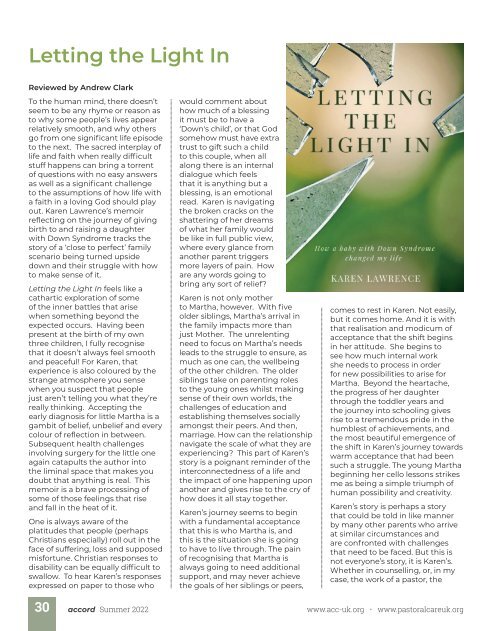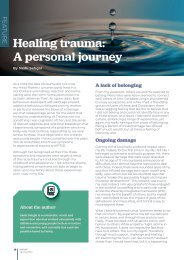ACC E-Accord Summer 2022
You also want an ePaper? Increase the reach of your titles
YUMPU automatically turns print PDFs into web optimized ePapers that Google loves.
Letting the Light In<br />
Reviewed by Andrew Clark<br />
To the human mind, there doesn’t<br />
seem to be any rhyme or reason as<br />
to why some people’s lives appear<br />
relatively smooth, and why others<br />
go from one significant life episode<br />
to the next. The sacred interplay of<br />
life and faith when really difficult<br />
stuff happens can bring a torrent<br />
of questions with no easy answers<br />
as well as a significant challenge<br />
to the assumptions of how life with<br />
a faith in a loving God should play<br />
out. Karen Lawrence’s memoir<br />
reflecting on the journey of giving<br />
birth to and raising a daughter<br />
with Down Syndrome tracks the<br />
story of a ‘close to perfect’ family<br />
scenario being turned upside<br />
down and their struggle with how<br />
to make sense of it.<br />
Letting the Light In feels like a<br />
cathartic exploration of some<br />
of the inner battles that arise<br />
when something beyond the<br />
expected occurs. Having been<br />
present at the birth of my own<br />
three children, I fully recognise<br />
that it doesn’t always feel smooth<br />
and peaceful! For Karen, that<br />
experience is also coloured by the<br />
strange atmosphere you sense<br />
when you suspect that people<br />
just aren’t telling you what they’re<br />
really thinking. Accepting the<br />
early diagnosis for little Martha is a<br />
gambit of belief, unbelief and every<br />
colour of reflection in between.<br />
Subsequent health challenges<br />
involving surgery for the little one<br />
again catapults the author into<br />
the liminal space that makes you<br />
doubt that anything is real. This<br />
memoir is a brave processing of<br />
some of those feelings that rise<br />
and fall in the heat of it.<br />
One is always aware of the<br />
platitudes that people (perhaps<br />
Christians especially) roll out in the<br />
face of suffering, loss and supposed<br />
misfortune. Christian responses to<br />
disability can be equally difficult to<br />
swallow. To hear Karen’s responses<br />
expressed on paper to those who<br />
would comment about<br />
how much of a blessing<br />
it must be to have a<br />
‘Down's child’, or that God<br />
somehow must have extra<br />
trust to gift such a child<br />
to this couple, when all<br />
along there is an internal<br />
dialogue which feels<br />
that it is anything but a<br />
blessing, is an emotional<br />
read. Karen is navigating<br />
the broken cracks on the<br />
shattering of her dreams<br />
of what her family would<br />
be like in full public view,<br />
where every glance from<br />
another parent triggers<br />
more layers of pain. How<br />
are any words going to<br />
bring any sort of relief?<br />
Karen is not only mother<br />
to Martha, however. With five<br />
older siblings, Martha’s arrival in<br />
the family impacts more than<br />
just Mother. The unrelenting<br />
need to focus on Martha’s needs<br />
leads to the struggle to ensure, as<br />
much as one can, the wellbeing<br />
of the other children. The older<br />
siblings take on parenting roles<br />
to the young ones whilst making<br />
sense of their own worlds, the<br />
challenges of education and<br />
establishing themselves socially<br />
amongst their peers. And then,<br />
marriage. How can the relationship<br />
navigate the scale of what they are<br />
experiencing? This part of Karen’s<br />
story is a poignant reminder of the<br />
interconnectedness of a life and<br />
the impact of one happening upon<br />
another and gives rise to the cry of<br />
how does it all stay together.<br />
Karen’s journey seems to begin<br />
with a fundamental acceptance<br />
that this is who Martha is, and<br />
this is the situation she is going<br />
to have to live through. The pain<br />
of recognising that Martha is<br />
always going to need additional<br />
support, and may never achieve<br />
the goals of her siblings or peers,<br />
comes to rest in Karen. Not easily,<br />
but it comes home. And it is with<br />
that realisation and modicum of<br />
acceptance that the shift begins<br />
in her attitude. She begins to<br />
see how much internal work<br />
she needs to process in order<br />
for new possibilities to arise for<br />
Martha. Beyond the heartache,<br />
the progress of her daughter<br />
through the toddler years and<br />
the journey into schooling gives<br />
rise to a tremendous pride in the<br />
humblest of achievements, and<br />
the most beautiful emergence of<br />
the shift in Karen’s journey towards<br />
warm acceptance that had been<br />
such a struggle. The young Martha<br />
beginning her cello lessons strikes<br />
me as being a simple triumph of<br />
human possibility and creativity.<br />
Karen’s story is perhaps a story<br />
that could be told in like manner<br />
by many other parents who arrive<br />
at similar circumstances and<br />
are confronted with challenges<br />
that need to be faced. But this is<br />
not everyone’s story, it is Karen’s.<br />
Whether in counselling, or, in my<br />
case, the work of a pastor, the<br />
30 accord <strong>Summer</strong> <strong>2022</strong> www.acc-uk.org • www.pastoralcareuk.org



